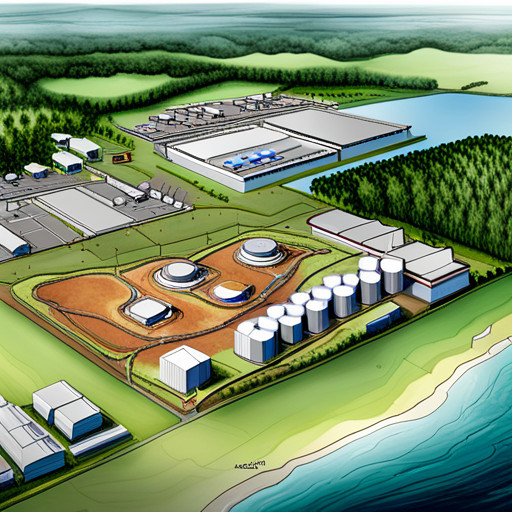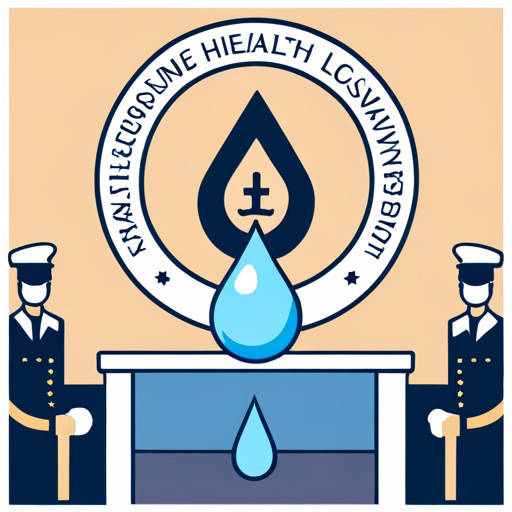Camp Lejeune Water Contamination Causes Health Risks and Legal Action
In the heart of North Carolina, a silent crisis unfolds at Camp Lejeune, a Marine Corps base. Decades of water contamination, caused by leaks from waste pits and fuel tanks, have left a toxic legacy. This invisible enemy, harboring lethal chemicals such as TCE and benzene, has been linked to severe health ailments.

This article seeks to explore the intricate web of causes, health implications, and legal battles entwined with the Camp Lejeune water contamination saga.
Key Takeaways
- Camp Lejeune water contamination was caused by the leakage of trichloroethylene (TCE), PERC, benzene, and vinyl chloride from waste disposal pits, underground fuel storage tanks, and a local dry cleaning company.
- The contaminated water at Camp Lejeune has been linked to serious health problems such as cancers, miscarriages, birth defects, and neurological disorders.
- Children born at Camp Lejeune may have an increased risk of developing cancer throughout their lifetimes, and maternal consumption of the contaminated tap water during pregnancy may have contributed to childhood leukemia in their children.
- The Camp Lejeune Justice Act allows Marine veterans and their families to seek compensation through lawsuits, but delays and challenges have been faced in processing claims and payouts.
Unraveling the Origin of Water Contamination at Camp Lejeune

The origin of water contamination at Camp Lejeune can be traced back to leaky waste disposal pits, underground fuel storage tanks, and a local dry cleaning company. These sources of contamination were located in close proximity to the camp, thereby facilitating the diffusion of toxins. Investigations into these sources revealed that improper disposal methods and inadequate supervision contributed to this environmental catastrophe.
Further examination of the long-term effects of Camp Lejeune water contamination revealed an alarming increase in health issues among the exposed population. This includes an elevated risk of cancer, neurological disorders, and adverse pregnancy outcomes. These findings underscore the significance of addressing such contamination promptly and effectively.
Health Implications of the Water Contamination

Exposure to polluted groundwater has been associated with a multitude of severe health problems, including various types of cancer, neurological disorders, and pregnancy complications. Pertaining to the Camp Lejeune incident, the contamination led to a significantly increased incidence of these health issues among residents.
The primary causal agents were harmful substances such as trichloroethylene (TCE), PERC, benzene, and vinyl chloride. Given the severity of the situation, compensation options were explored for affected individuals. Several lawsuits ensued, leading to the introduction of the Camp Lejeune Justice Act. This Act permitted victims to seek compensation for their health-related suffering.
Concurrently, environmental remediation efforts were initiated to restore the water quality. However, the complete restoration and decontamination of the site may take several decades.
Keeping up With Camp Lejeune Water Contamination Lawsuits

Following the introduction of the Justice Act, numerous lawsuits have emerged, with plaintiffs seeking compensation for the health issues purportedly caused by polluted groundwater. These Camp Lejeune water contamination lawsuit updates highlight the ongoing legal battles and the compensation challenges faced by Camp Lejeune victims.
| Case Status | Compensation Challenges |
|---|---|
| Active litigations | Proving causation between health issues and water contamination |
| Pending settlements | Quantifying damages for various health conditions |
| Completed settlements | Navigating complex legal processes |
| Appeals | Overcoming legal defenses raised by the government |
These lawsuits, while a beacon of hope for many victims, are also a stark reminder of the hurdles they must overcome to secure just compensation for their suffering. The fight for justice continues, amidst legal complexities and mounting health concerns.
Understanding the Roadblocks in the Camp Lejeune Justice Act

Implementation of the Justice Act has encountered considerable roadblocks, primarily due to the complexities involved in proving causation and quantifying damages for various illnesses.
The Act, designed to help Marine veterans affected by the Camp Lejeune water contamination, has been hindered by legal and procedural hurdles. Proving direct causation between exposure to contaminated water and specific health conditions presents a significant challenge, often requiring extensive medical and scientific evidence.
Additionally, quantifying damages for the wide array of potential illnesses involves intricate and highly specialized knowledge. Another roadblock in compensation lies in the bureaucratic process, with many veterans finding the procedures for claiming benefits to be convoluted and time-consuming.
These factors collectively contribute to the difficulties faced in the implementation of the Act.
Evaluating Legal Help for Camp Lejeune Justice Act Claimants

Representation for claimants under the Justice Act is provided by firms which specializes in handling serious injury and death claims. This firm, among others, offers expertise in the complex legal landscape surrounding Camp Lejeune water contamination.
Finding legal representation can be crucial in navigating the intricate process of asserting compensation eligibility under the Justice Act. Some key considerations include:
- The firm's experience in handling similar cases.
- The firm's knowledge of the specific regulations and laws associated with the Justice Act.
- The firm's capacity to provide personalized attention to each client's case.
Thus, the choice of legal representation can significantly impact the eventual outcome for claimants seeking compensation for the harm resulting from the Camp Lejeune water contamination.
Unmasking the Long-term Impact of Camp Lejeune’s Water Contamination

Unveiling the enduring repercussions of the tainted aquifer incident, it becomes evident that the prolonged exposure to harmful chemicals has instigated a multitude of severe health conditions among the affected individuals.
Investigations into long-term health effects reveal an increased prevalence of cancer, neurological disorders, and birth defects. Mothers exposed during pregnancy have been linked to cases of childhood leukemia.
Cleanup efforts at Camp Lejeune are extensive, yet the contaminants persist, hinting at the magnitude of the initial pollution. The remediation process, expected to span decades, includes filtration systems to extract toxins from the groundwater.
The ongoing health surveillance of the exposed population is crucial to fully comprehend and address the impact of this contamination, emphasizing the severity and longevity of this disastrous incident.
Frequently Asked Questions
What Steps Are Being Taken to Prevent Future Water Contamination at Camp Lejeune?
To prevent future water contamination at Camp Lejeune, rigorous monitoring of potential contamination sources is implemented. Remediation strategies include the removal of hazardous substances and consistent testing of water quality to ensure safety standards are met.
Are There Any Ongoing Health Studies on the Effects of the Water Contamination at Camp Lejeune?
Ongoing studies are indeed examining the long-term health effects of the water contamination at Camp Lejeune. These investigations consider the contamination timeline and advances in treatment for related health conditions.
How Can Former Residents of Camp Lejeune Get Tested for Health Issues Related to the Water Contamination?
Former residents of Camp Lejeune can undergo comprehensive medical examinations for potential health issues related to water contamination. These testing procedures, often covered by medical insurance, aim to detect associated conditions early for optimal treatment outcomes.
What Are the Criteria for Eligibility to Claim Benefits Under the Camp Lejeune Justice Act?
Eligibility for benefits under the Camp Lejeune Justice Act requires proof of residence on the base during contamination period, medical evidence of related illness, and successful navigation of claim process simplification under Justice Act implementation.
How Does the Camp Lejeune Justice Act Impact the Spouses and Children of Marines Affected by the Water Contamination?
The Camp Lejeune Justice Act implementation extends its reach to spouses and children of affected Marines, offering potential recourse. Spousal support programs are under continual exploration to provide comprehensive aid in respect to this contamination crisis.

This post has been generated by AI and was not reviewed by editors. This is Not legal advice. Please consult with an attorney.




